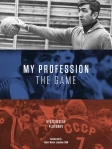John Wooden is by any measure a coaching icon. In the first instance, there is his record as a coach: ten NCAA championships in twelve seasons while coaching some of the greatest college basketball players ever. Then there are the teachings that survived his career, highlighted by his Pyramid of Success and his definition of success. His teaching methods were studied to determine how other coaches should coach (here and here). He was famously revered by his players. His position in the coaching world is unassailed. And yet what really hit home to me how wide his reputation has spread was while travelling with an Italian coach in the US. After going our separate ways in a shopping centre (when in Rome… as they say), we met up again and he breathlessly explained in his extremely broken English how he had found a whole shelf of books on and by John Wooden. “You know about John Wooden?”, I asked. “Of course!”, he replied with a look of confusion.
It was then with great anticipation that I read the first comprehensive biography of him (Wooden: A Coach’s Life) almost as soon as it came out. I had three goals in reading the book. Obviously to read the story of his life, hopefully to pick up some new insights and also to get some balance about his life and coaching under the ‘companion books theory‘. I succeeded in each of those three goals and learnt four important things about John Wooden and maybe great coaches in general.
Competitiveness – Wooden was really competitive. He didn’t show it always to his team in the sense that he never spoke of winning, but he really wanted to win. He was a inveterate trash talker with referees and opposing players and loved to beat his players at shooting contests and pool. This was a same lesson as when reading the Phil Jackson biography (incidentally the only interesting thing in an otherwise non inspiring rehash of a dozen other books). It should go without saying that successful coaches are more competitive than even every day coaches but it is not something that is often written about. The coaches themselves never write about it in their own books because in the end, competitiveness is unpleasant and uncomfortable and often borders on the antisocial. And nobody wants to write about that in their own books.
Compromise – Another thing you will never read in a coach’s book is how he compromised his principles. Most coach’s books are idealised versions of that coach. He writes a book to tell a version of himself that he wants others to think about, or to sell a product. The coach’s own story is always about how success is the result of his strong (and at least by implication, unique and unbending) principles. Wooden was no different in that regard. All of his writings speak of his principles and tell stories such as the time he forced his star player to cut his hair and shave his beard. But as in all real life coaching stories, success requires strong principles and many compromises.
Relationships – As I mentioned he was famously revered by his ex players. But it turns out that almost without exception, while they were playing for him they respected him personally and his skills as a coach, but did not like him and had virtually no relationship with him outside of the training and playing environment. The close relationships he had with his players all began long after he had finished coaching them. That was certainly something of a revelation.
Preparation – One thing that I had heard before but definitely bears repeating is his study and preparation. Each off season he made it a point to review all of his old practice plans and to study one specific area of the game. To study the game he called and visited other coaches who were known to be experts in that area. In one particular instance related in the book he filled over 30 notebooks during one off season. He won the championship that season. Apparently how you stay at the top is continually study and prepare. Who knew.
If you are interested in coaches and coaching I would recommend Wooden: A Coach’s Life. I would not recommend Phil Jackson: Lord of the Rings.
__________________________________________________________________________________________________
Read about the great new Vyacheslav Platonov coaching book here.


3 comments